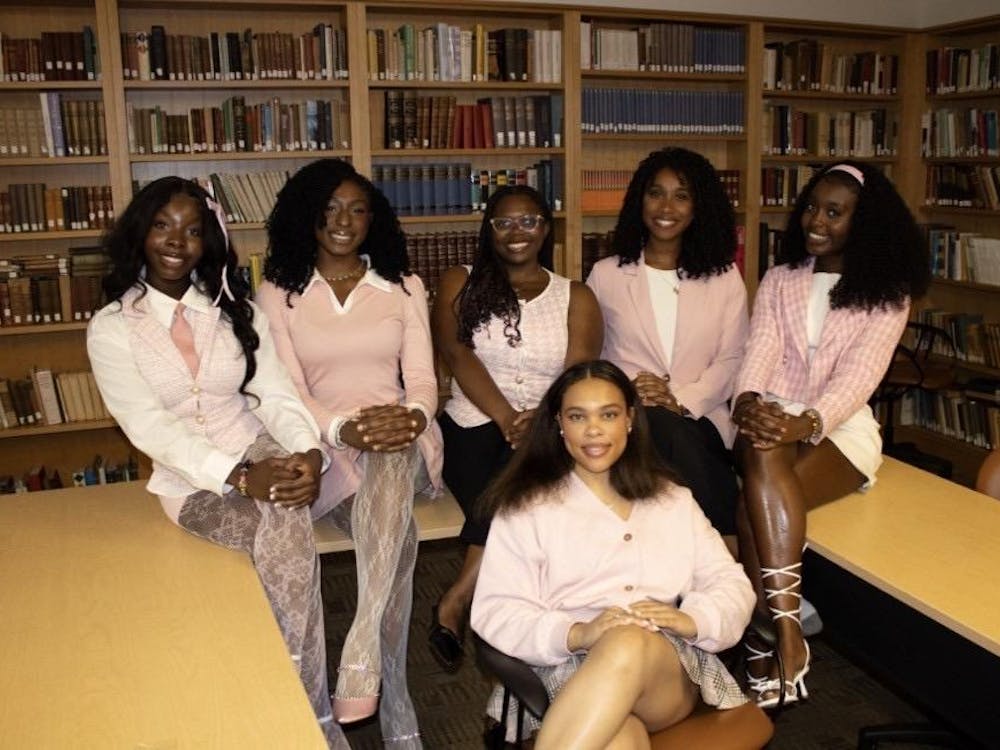Witness the two sides of greater Charlottesville. Past the fraternities and sororities of Rugby Road are homes the average University student might never see. The houses are small and tightly packed together, but they are home to many hard-working Charlottesville residents struggling to meet rent payments.
It is here, however, that Habitat for Humanity intervenes.
On Sept. 8 representatives from the Inter-Fraternity Council and the Inter-Sorority Council Community Service Committees, the Venable Neighborhood Association and Habitat for Humanity gathered for the Groundbreaking, or the first day of construction, of the Early house on 10 1/2 Street.
Shirley Early, a University Projects employee who will be the new owner of this Charlottesville Habitat House, also attended the groundbreaking to cut the ceremonial ribbon.
With a radiant smile, Early displayed an air of pride and joy as she clipped the white ribbon.
Work, however, is something almost too familiar to Early, who cleans dorms at the University.
Before securing her position at the University just over a year ago, Early put in her hours in the hot kitchens of Winnie's fast food restaurant and later, at McDonald's. But with her 13-year-old daughter, Shannon, getting ready for high school, Early needed a job with benefits.
"I just kept on working and filling out applications," Early said. "It was hard. There were no benefits at Winnie's."
With regard to the challenges in the life of a hard-working single mother, Early keeps her head high and her chin up.
"You just have to do the best you can," Early said. "I always just kept on praying and hoping."
Early's hopes and prayers, however, appear to have finally been answered by Habitat for Humanity and droves of eager volunteers.
Early has been renting houses in Charlottesville for 14 years and is thrilled as well as relieved to have the chance to build a home in her new house.
A home is "something you can say is your own," Early said. "You can have your own privacy, and you can feel comfortable not renting from other people."
Early said that having a home to share with her daughter Shannon will give her longed-for security.
"It will be a quiet thing," Early said.
At the groundbreaking ceremony for Early's house, Kevin O'Halloran, president of the Venable Neighborhood Association, expressed his excitement about the project and urged everyone to continue their commitment to the cause.
O'Halloran said that most of the grunt work needs to be done on Fridays and Saturdays.
"The fast part is now, but the hard work and details come later," he said. "I'm sure Shirley is as glad as anyone to see this house go up."
Fund-raising efforts for the Early house began two years ago. O'Halloran said Peter Leary, the IFC service chair at the time, was the guiding force behind getting the project started.
Through letter-writing and fund-raising phone calls, the VNA and the Greek system have raised $21,000 of the $45,000 needed to complete the Early house. Further fund-raising efforts are currently under way, and the proceeds from the University's Greek Week also go toward the construction on Early's house.
Leaders from the Greek community were excited about the chance to give back to the larger Charlottesville community.
"Support from the houses has been overwhelming," said Kathy Schneider, a fourth-year College student and ISC community service co-chair. "So many people have things to say about the Greek System, but this is this type of thing we like to do and like to be known for."
Individual fraternity and sorority houses have had the chance to sign-up ahead of time for volunteer dates, and volunteer dates are booked through November.
"People have asked for double days," said ISC President Kristin Braggins. "There has been more demand than space available."
But getting from planning to building seemed like a long time coming for Early and others. The project was set to begin last spring but was delayed due to planning and logistical factors.
"Starting from ground zero" was a challenging thing to do, IFC Community Service Chair James Aldige said.
Aldige expressed particular frustration with obstacles he met last spring that were beyond his control. Factors such as rain delays postponed build dates for the project.
"By the time we were ready to start last year, it was May, and people were going into exams," Aldige said. "Things are running much more smoothly now than last March."
While Service Committee chairs fretted via e-mail and telephone in their struggle to get the Early house under way, Shirley Early herself patiently waited her turn to get her hands on the house. In the meantime, Early put in nearly 245 hours of "sweat equity" - a term coined by Habitat for Humanity - on houses for her neighbors. Through the Habitat for Humanity organization, "partner families" invest hundreds of hours of labor into the construction of their own houses and others in exchange for the chance to create their own home, complete with an interest-free mortgage.
"I have built a lot of houses on Emerald Street," Early said. "It's nice to learn different things, but I'm glad to work on my own house now."
But before Early has the chance to see her finished home on the expected completion date of Dec. 8, 2001, several volunteers and Habitat workers will have devoted many enthusiastic man-hours to the effort on 10 Street.
Everyone from Community Service Chairs to first-year volunteers, community members and professors joined to haul concrete blocks last Saturday.
"It's great to be able to not only build a house, but also build a relationship with the woman who will live here," said Allison Knowles, a third-year Commerce student and ISC community service co-chair.
Alongside Knowles and others, first-year students also delved in early and got their hands dirty.
"It's great to for the community to come together and to actually get to work with the person to live here," first-year College student Kristen McElligott said. "It's a really emotional experience to create a shelter."
University professors also turned out for the groundbreaking despite the glare of the late-summer sun. Though students are likely to only be able to donate Friday and Saturdays to their volunteer building efforts, others will join the effort mid-week.
"Mostly retirees work during the week," Engineering Prof. John Bean said. Thus far, Bean has helped build 30 homes for Habitat for Humanity.
Whether volunteers are future homeowners, University students, Charlottesville residents or professors, Schneider put it best when she said, "It's a community effort"






